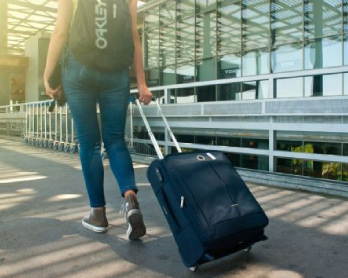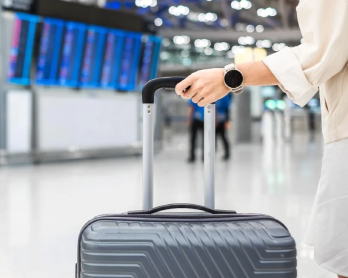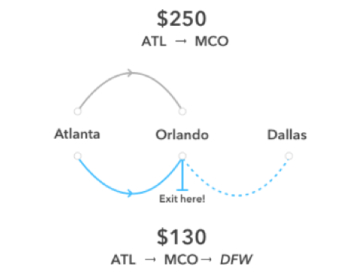A few days ago, I came across a news story about a teen who tried to skiplag to save on airfare. However, it turned into a nightmare after American Airlines found out his planning. Although it is not an illegal act, it is certainly a violation of the airline’s conditions of carriage.
Skiplagging is an ultimate hack to save on airfare. But airlines frown upon it and can take actions against the passenger who does this. This includes eliminating your miles and credit points and even banning you from traveling with the airline in future.
Skiplagging is a money saving trick for air passengers. Skiplagging or ‘Hidden City Ticketing’ is a practice done by the travelers to get cheap flight tickets. But do you know what skiplagging actually is and how air travelers save money by using this trick? Let’s Find out.
What Is Skiplagging?
Skiplagging is a trick used by the air passenger, where they book a flight with a stopover, where the stopover airport is the passenger’s actual and intended destination. Now you must be thinking, why does a passenger do that? Well, if you are a frequent traveler, you must know that flights with one or two layovers are cheaper than direct or nonstop flights.
For example, a direct flight from JFK to DCA may cost you around $103. But if you book a flight from JFK to BOS with one layover at DCA, it may cost just $88. So, instead of paying $103 for a direct flight, you can save $15 by booking a JFK to BOS flight with one layover at DCA.
Remember, flight ticket prices regularly fluctuate.
Although it is one of the best hacks to get cheap flight tickets, remember that it won’t work if you are traveling with checked baggage. Your luggage is tagged for the final destination. If you ask the airline to offboard your luggage at the stopover, there will be consequences as per the airline’s policy.
Also, this hack only works for one-way tickets. Once the airline realizes you have skipped the second leg of the journey with the airline, it will automatically cancel your return ticket
Why Is Skiplagging Controversial?
Skiplagging is not illegal. But with the example above, you already know that airlines hate this practice. But why do airlines dislike this practice when they are getting money for the complete journey?
Airlines operate under a hub and spoke model, where flights with layovers are channeled through a hub airport before connecting to other airports. In the case of smaller airports, flights usually pass through a hub airport en route to their final destination and hence, they want to fill the seats with passengers.

Why Do Airlines Hate Skiplagging?
Airlines have made ticket price structure complex, which is virtually incomprehensible for the average consumer. It wants to maximize its revenue, and if a seat goes empty, there’s no way to recover the revenue. Skiplagging is like beating the airlines in their own game.
Airlines want to extract as much as they can and that is what business is all about. But its pricing is somewhat complex and the fare into a hub is nonsensically high. This is how the airline itself invites people to make hidden city booking. Why would anybody book a direct flight to somewhere at a huge price, when they can use this sneaky hack to get the best deal available!
Skiplagging prevents airlines from maximizing their revenues as they would have likely earned a higher fare if they had sold the seat directly. This hidden-city ticketing reduces the yield per seat and adds complexity to an already low-margin industry.

How Does Skiplag Work?

Robert, an air passenger, booked a flight from Phoenix to Atlanta with a stopover at Chicago at $68 with Frontier Airlines. But the direct flight from Phoenix to Chicago was $77. So, he decided to skiplagged the last phase of the journey and deboard the flight at Chicago Midway International Airport (MDW).
Air passengers who want to skiplagged flights the second leg of the ticket search for flights for a different final destination with one layover at the airport where the passenger actually wants to deboard. However, they do it only when the direct flight’s price is more expensive than a connecting flight with the intended city being the stopover.
What Are the Risks of Skiplagging
Skiplagging is not illegal and you can file a lawsuit against the airline if they harass you for not completing the final phase of your journey. But remember that each airline has their own sets of terms and conditions and before you decide to skiplag, read their policy well. The additional risks that come with the skiplagging are as follows:
The plan of skiplagging will flop in case you have checked baggage. Since it has to be checked to your final destination, you won’t receive it even if you deboard the flight. Unless you are on an inbound international flight for certain routes and airports, where you have to claim your bag at the first stopover airport. So, skip the plan to bring a larger bag if you are skiplagging.
In some events, customers are forced to check carry-on bags when overhead bins fill.
While it is not illegal and airlines cannot detain you or have you arrested, the airline could certainly punish you by blacklisting you from flying with the airline for lifetime, could ban your frequent flyer program, eliminate your miles or rewards points, and even force you to buy a new ticket.
Flight schedules are unpredictable and if there are technical reasons, bad weather conditions, and other issues, the airline opts to reroute your flight through a different city, which means the stopover airport could change, then you have to buy another ticket from the flight’s final destination to your intended destination. It could be expensive!
You cannot book a return ticket if you are skiplagging. Once the airline realizes your trick, it will automatically cancel your return ticket. So, you have to buy two different one-way tickets.
Apart from the aforementioned risks, Anton Radchenko, CEO and co-founder of AirAdvisor adds, “Travelers who skiplag might run into issues with their travel insurance. Most insurance companies require travelers to follow through on their travel plans and skiplagging can result in voided travel insurance.”
In such cases, where airlines take actions against your act, you can drag the airline to court and you can even win the legal battle.
In 2019, Lufthansa sued a passenger for skiplagging. The passenger paid € 657 for a flight from Oslo to Seattle via Frankfurt. On the return flight, the passenger skipped the Oslo leg, and took flight from Frankfurt to Berlin on a different ticket. Lufthansa claimed that the ticket should have cost € 2769 and demanded for the rest of the amount. The court’s verdict went in favor of the passenger, but the court also agreed that the airline suing the passenger is valid. The court views it as a lack of transparency.
Can You Skip the First Leg of Flight?
If you have a connecting flight and you skip the first leg of the journey, then your entire ticket will be canceled. However, if you have a valid reason to skip the first leg of the flight, then the airline might allow you to board the second flight. But it depends on airline policies and your convincing skills.
In case of an emergency, such as a medical condition, death of an immediate family member, and other unforeseeable circumstances, you should call the airline informing them of the issue. The airline may consider and allow you to board the second flight. Basically, no matter what you must notify the airline so that they at least consider not canceling your entire ticket.
Is Skiplagging Legit?
Skiplagging is just a sneaky hack to get cheap tickets on certain flights. Despite airlines hating the act, it is legit and is popular among savvy flyers. By booking a hidden city ticket, you might be able to crack a good deal, but if the airline catches you sneaking out then there would be consequences. However, till date there is no such law that forbids passengers from skiplagging.
In 2014, United and Orbitz filed a lawsuit against Skiplagged flight. When the verdict went against them, the airlines turned to punish passengers by banning them from flying with the airline for certain years, cutting down their hard-earned points and miles, and even imposing fines.
So, even if you can save money on flight tickets, there are downsides of skiplagging too. And this leads to why you should be careful about using this hack.
Is Skiplagging Worth It?
In 2021, American Airlines issued a warning to all travel agents to crack down on skiplagging passengers. Lufthansa tried to sue a passenger and failed. And United Airlines has even asked its airport staff to monitor passengers on stopover airports who indulge in skiplagging. However, nothing helped these airlines stop passengers skiplagging.
So, American Airlines has clearly mentioned in its fine print that it has the right to take action against the passenger by canceling any unused portion of the ticket, blacklisting the passenger, and imposing a fine.
If you look at Air France’s flight ticket carefully, you can see that the airline has specified their rules in case of any abnormal travel.
“The fare is applicable for a ticket used fully, in sequential order for the specified journey and on the specified dates. As outlined in the General Conditions of Carriage, any non-compliant use noticed on the day of travel may incur an additional flat-rate fee at the airport for the amount of: €125 in the Economy cabin and €300 in the Business cabin, for flights within Europe… €500 in the Economy and Premium Economy cabins, €1,500 in the Business and La Première cabins… for intercontinental flights.”
Bottom Line
In certain instances, you can save a considerable amount by booking a flight with layovers and then skiplag the second leg of the journey. But it is a risky bet and if you are not willing to take the risk, it is best to find alternate ways to get cheap flights.If you are a frequent flyer, use your points and miles to book a ticket and open up premium cabins. Being flexible with dates of travel could be a savior too. And booking in advance may save you big bucks.